On Tuesday, Dublin witnessed further protests amid a rise in anti-migrant rhetoric in Ireland. The unrest comes as the government struggles to house asylum seekers due to an ongoing housing shortage.
New protests erupted in South Dublin on Tuesday evening (May 22) in response to a newly contracted accommodation center, preventing the first group of asylum seekers from accessing the facility. At least one bus had to turn back at the Ballyogan center near Carrickmines.
Social media footage showed protesters, including children, and a large Gardaí (police) presence at the entrance. The asylum seekers were reportedly from temporary centers in Dundrum or Citywest, not from Dublin’s canal area, where migrants have been camping out in the streets.
Images on X (formerly Twitter) show protesters and police at the gates of the Ballyogan facility, which was previously used for Ukrainian refugees. The facility has an 11-month contract with Dún Laoghaire Rathdown County Council to shelter asylum seekers applicants due to a growing accommodation crisis. It can house up to 300 individuals.
The protest highlights ongoing challenges for the government and state agencies in fulfilling their legal obligations to support asylum seekers.
Tánaiste (the deputy prime minister of the Republic of Ireland) Micheál Martin mentioned that people are expected to move to another site, Thornton Hall, in north county Dublin within the next few weeks, which will provide military-grade tents and basic amenities. However, local residents expressed concerns about the site's capacity and lack of communication from authorities.
Helena McGann, a spokesperson for the Thornton Hall and Environment Support Group, consisting of up to 20 local residents, told The Irish Times that the infrastructure is not sufficient to support a large number of people.
"No one is telling us anything," she said. "How many people are they planning to put there? There are 162 acres available. If they fill all of that, that’s an awful lot of people."
Also read: Ireland: Tensions over refugee crisis and Dublin tent cities
Nine charged in relation to protest
Nine people have been charged in relation to this week's protests in Ballyogan. Five men and four women appeared before Dún Laoghaire District Court charged with public order offences following a protest at a Ballyogan asylum seeker center in South Dublin.
The individuals, aged 20 to 60, were arrested during the incident in Carrickmines. Eight faced public order charges, while one man was also charged with possessing a Stanley knife.
Police opposed bail for some due to concerns about interference with witnesses and the prevention of a staff member from leaving the center despite a medical condition.
Judge Anne Watkin granted bail to several individuals under strict conditions, including staying away from the center and daily check-ins at a the police station.
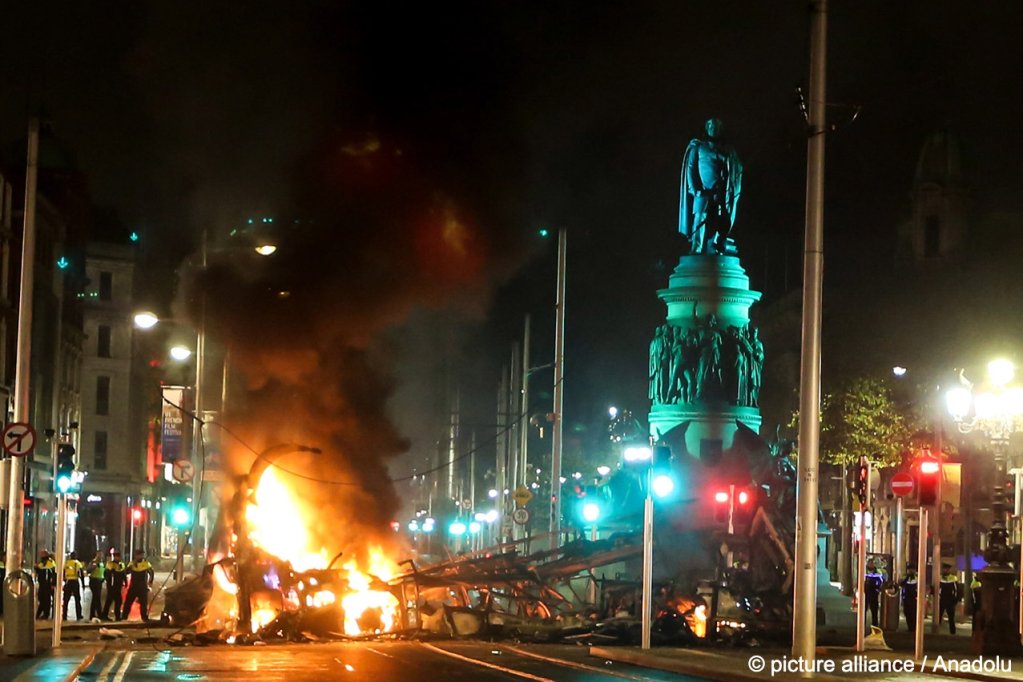
In late November, riots erupted in Dublin, highlighting growing social tensions in Ireland. Political leaders blamed far-right agitators for inciting unrest amid increasing immigration. The violence began following a stabbing attack that injured three children, initially attributed on social media to an "illegal immigrant." However, the suspect, later caught by police, is a naturalized Irish citizen who had lived in Ireland for 20 years.
Since the riot, there has been further unrest, albeit on a smaller scale. Earlier this month, demonstrators from pro and anti-migrant groups clashed for hours in central Dublin, with some violent scenes reported from the area, according to investigators.
Also read: Fire destroys makeshift migrant camp in Dublin
Severe housing shortage
The growing housing crisis is evident in Dublin and across the country, where many asylum seekers are forced to sleep in tents as they wait for their applications for protection to be processed. This situation is exacerbated by a general lack of housing, an increase in refugees fleeing the war in Ukraine, and rising xenophobia, which has led to anti-migrant protests and arson attacks on asylum facilities.
On their website the Irish government stated that despite "intensive efforts to source emergency accommodation, the Department is currently not in a position to provide accommodation to all International Protection Applicants due to the severe shortage."
Single men who present to the International Protection Office (IPO) are assessed by the International Protection Accommodation Services (IPAS). Those who consent to an assessment are then asked questions to identify any significant vulnerabilities.
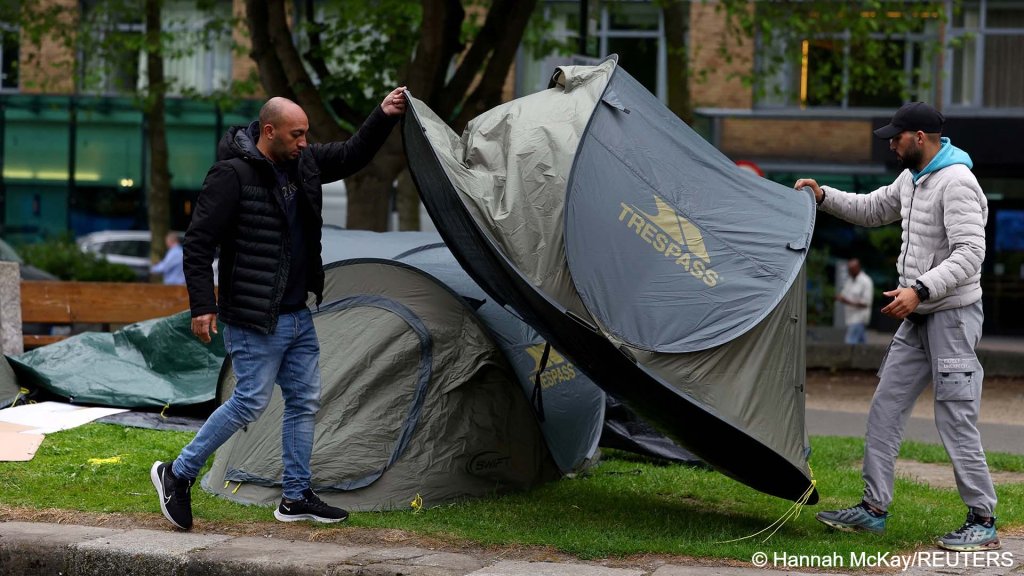
If an applicant indicates a current or ongoing health need, they are referred to a Health Service Executive (HSE) team at the IPO for an initial review. The HSE will then inform IPAS staff if there is an urgent health need. Based on this information, IPAS staff determine if the applicant requires priority accommodation and recommend offering accommodation immediately or as soon as it is available.
The government also notes that for asylum seekers not provided with accommodation, there will be a temporary increase in their Daily Expense Allowance (DEA) by 75 euros, raising it from 38.80 euros per week to 113.80 euros per week for all eligible applicants.
According to the latest figures, a total of 3,352 eligible male asylum seekers have presented since December 4, 2023. Of those men, accommodation was offered to 331 individuals as a priority due to their vulnerability. The remaining 3,021 received a contingency payment in lieu of accommodation and 1,098 of these were subsequently offered accommodation. A further 1,923 are still waiting to be housed. In the absence of emergency housing many are living in tents while they wait for their applications to be processed.
Also read: Ireland seeks to solve asylum accommodation crisis, opts in to EU migration pact
Fallout from UK government's Rwanda policy
In April, Ireland's deputy prime minister Martin told The Daily Telegraph newspaper that the UK's Rwanda policy was affecting Ireland, as people were "fearful" of staying in the UK. He noted that asylum seekers were seeking "to get sanctuary here and within the European Union as opposed to the potential of being deported to Rwanda".
The threat of deportation had arguably pushed migrants to cross the border from Northern Ireland into the Republic of Ireland. Referring to the UK's controversial asylum policy, Martin stated that "maybe that's the impact it was designed to have."
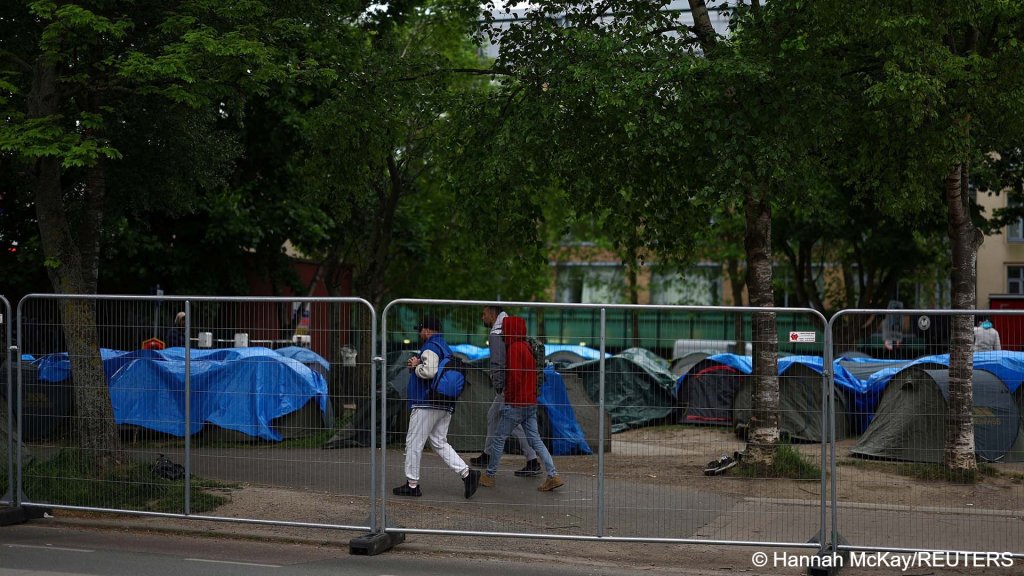
In an interview with Sky News last month, UK Prime Minister Rishi Sunak was asked about Martin's comments, saying they illustrated that the Rwanda scheme is already "having an impact" as a deterrent.
"People are worried about coming here and that demonstrates exactly what I'm saying," he said. "If people come to our country illegally, but know that they won't be able to stay there, they are much less likely to come, and that's why the Rwanda scheme is so important."
There has been a significant increase in migration in Ireland, with the Irish International Protection Office having recorded a 98 percent increase in asylum applications compared to the same period last year.
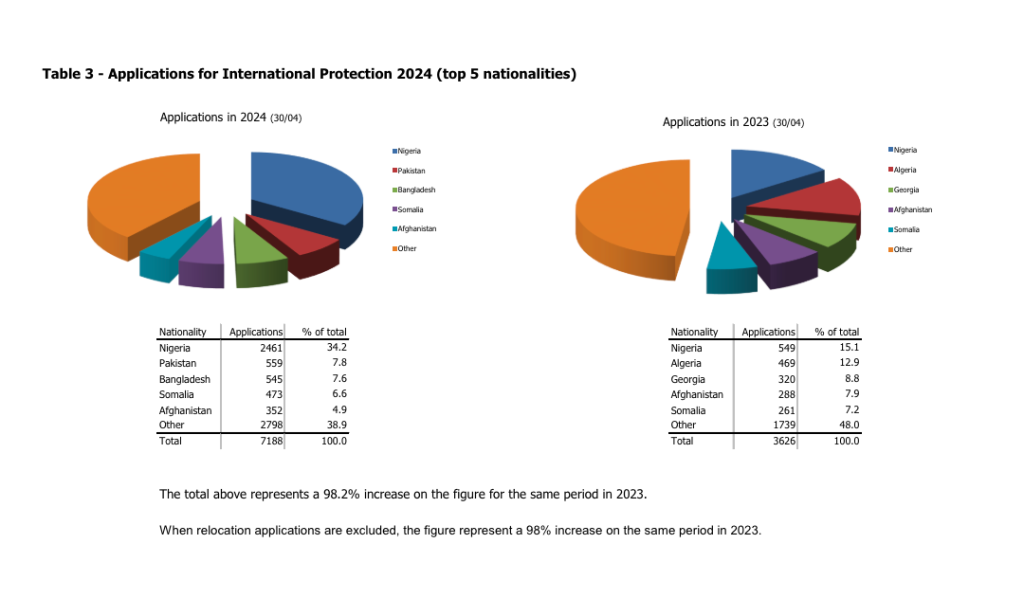
The border between Northern Ireland and the Republic of Ireland is the only land border between the UK and the EU. Without immigration checks at this border, it remains effectively "open" to UK-based migrants seeking asylum in an EU country.
Also read: Asylum seekers trying to escape Rwanda policy fleeing to Ireland
Charities receive threats for helping asylum seekers
Aubrey McCarthy, founder of Tiglin at the Lighthouse charity, has reported receiving personal threats as well as threats to burn down the charity's premises due to their work helping asylum seekers. The charity works with the IPAS and the Department of Integration to provide tents and sleeping bags to unhoused people.
Despite having helped unhoused people in Ireland for many years without incident, the threats began when the long queues formed outside their building, which according to McCarthy attracted some negative attention.
In response, the charity conducted a risk assessment and relocated people within the building for safety. McCarthy emphasized that their mission is to help vulnerable people regardless of their background, and he expressed concern for the safety of his staff and volunteers.
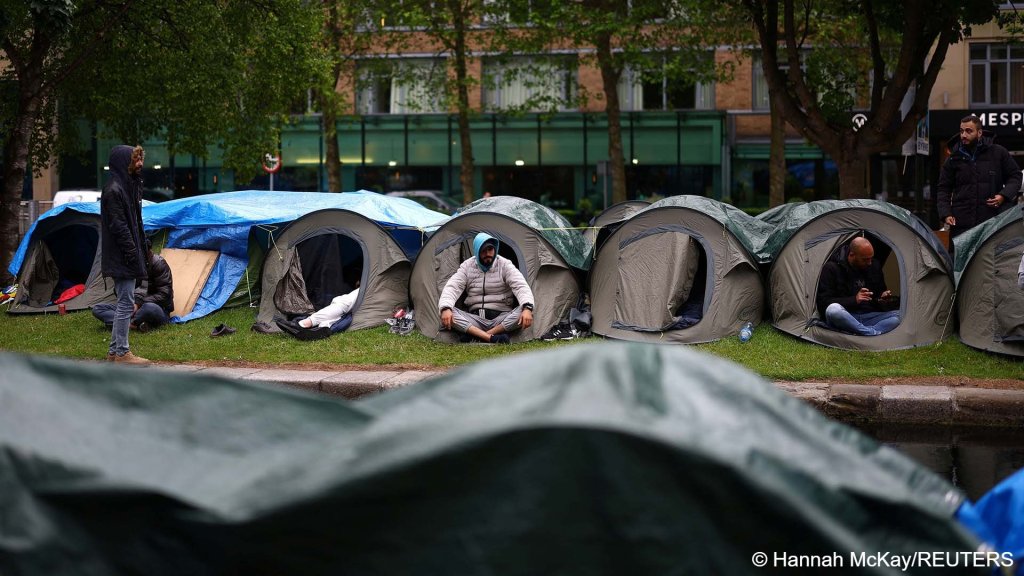
The threats have been reported to the local police, and McCarthy has provided a statement. Despite the threats, the charity continues its work, including hosting events to support the unhoused community.
McCarthy told the Irish radio station Raidió Teilifís Éireann (RTE) that IPAS has "instructed us to work with the vulnerable individuals that come to us," provided they present the relevant blue card that shows they have applied for international protection. However, he also noted that although they follow government instructions, some government members have criticized the distribution of tents.
In Dublin, barriers have been placed along the Grand Canal where many migrants have been living, to prevent tent pitching by unhoused migrants. Integration Minister Roderic O'Gorman has promised accommodation for all asylum seekers in the coming months, but emphasized the immediate need for more emergency shelter spaces. The use of state land is part of the plan to provide safe locations for asylum applicants.
Meanwhile, the minister defended the work of charities providing tents, stating that the goal is to prevent people from being entirely destitute.
Also read: Migrant tent camp returns to Dublin just days after clearance
